Related Research Articles

A Burns supper is a celebration of the life and poetry of the poet Robert Burns, the author of many Scots poems. The suppers are normally held on or near the poet's birthday, 25 January, known as Burns Night (Scots: Burns Nicht; Scottish Gaelic: Oidhche na Taigeise; also called Robert Burns Day or Rabbie Burns Day. However, in principle, celebrations may be held at any other time of the year. Burns suppers are held all around the world.

Ayrshire is a historic county and registration county in south-west Scotland, located on the shores of the Firth of Clyde. Its principal towns include Ayr, Kilmarnock and Irvine and it borders the counties of Renfrewshire and Lanarkshire to the north-east, Dumfriesshire to the south-east, and Kirkcudbrightshire and Wigtownshire to the south. Like many other counties of Scotland it currently has no administrative function, instead being sub-divided into the council areas of East Ayrshire, North Ayrshire and South Ayrshire. It has a population of approximately 366,800.
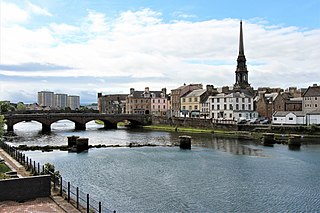
Ayr is a town situated on the southwest coast of Scotland. It is the administrative centre of the South Ayrshire council area and the historic county town of Ayrshire. With a population of 46,982 Ayr is the 16th largest settlement in Scotland and second largest town in Ayrshire by population. The town is contiguous with the smaller town of Prestwick to the north.
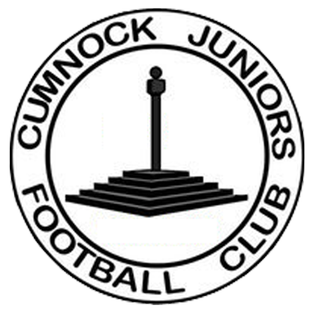
Cumnock Juniors Football Club are a Scottish football club based in Cumnock, Ayrshire.
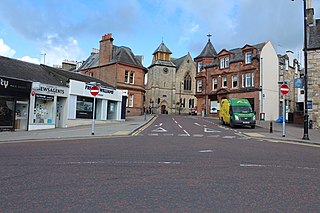
Cumnock is a town and former civil parish located in East Ayrshire, Scotland. The town sits at the confluence of the Glaisnock Water and the Lugar Water. There are three neighbouring housing projects which lie just outside the town boundaries, Craigens, Logan and Netherthird, with the former ironworks settlement of Lugar also just outside the town, contributing to a population of around 13,000 in the immediate locale. A new housing development, Knockroon, was granted planning permission on 9 December 2009 by East Ayrshire Council.
William Neill was an Ayrshire-born poet who wrote in Scottish and Irish Gaelic, Scots and English. He was a major contributing voice to the Scottish Renaissance.
James Robertson is a Scottish writer who grew up in Bridge of Allan, Stirlingshire. He is the author of several short story and poetry collections, and has published seven novels: The Fanatic, Joseph Knight, The Testament of Gideon Mack, And the Land Lay Still, The Professor of Truth, and To Be Continued… and News of the Dead. The Testament of Gideon Mack was long-listed for the 2006 Man Booker Prize.

Robert Burns, also known familiarly as Rabbie Burns, was a Scottish poet and lyricist. He is widely regarded as the national poet of Scotland and is celebrated worldwide. He is the best known of the poets who have written in the Scots language, although much of his writing is in a "light Scots dialect" of English, accessible to an audience beyond Scotland. He also wrote in standard English, and in these writings his political or civil commentary is often at its bluntest.

That part of the United Kingdom called Northern Ireland was created in 1922, with the partition of the island of Ireland. The majority of the population of Northern Ireland wanted to remain within the United Kingdom. Most of these were the Protestant descendants of colonists from Great Britain.
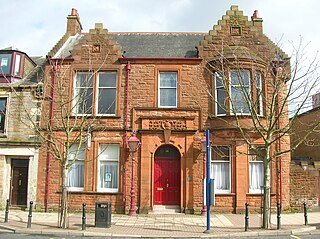
The Irvine Burns Club, based at the Wellwood Burns Centre & Museum, was founded on 2 June 1826 and is one of the world's longest continuously active Burns Clubs. At least five personal friends of Robert Burns were among the group of local gentleman, whose idea it was to form the club. Irvine in North Ayrshire is an old market town and port situated on the west coast of Scotland, approx 14 miles north of Ayr.
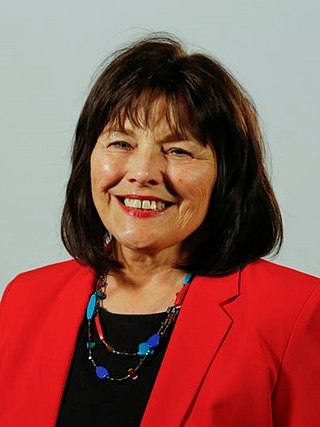
Jeane Tennent Freeman is a Scottish former politician who served as Cabinet Secretary for Health and Sport from 2018 to 2021. A member of the Scottish National Party (SNP), she was the Member of the Scottish Parliament (MSP) for the Carrick, Cumnock and Doon Valley constituency from 2016 to 2021.
Calum Colvin is a Scottish artist whose work combines photography, painting, and installation, and often deals with issues of Scottish identity and culture and with the history of art. He has had solo exhibitions at the Scottish National Gallery of Modern Art, Scottish National Portrait Gallery, and Royal Scottish Academy and has a number of works in the collections of the National Galleries of Scotland, Tate Galleries, and the British Council. He is also Professor of Fine Art Photography and Programme Director, Art & Media at Duncan of Jordanstone College of Art and Design, part of the University of Dundee.

Scots-language literature is literature, including poetry, prose and drama, written in the Scots language in its many forms and derivatives. Middle Scots became the dominant language of Scotland in the late Middle Ages. The first surviving major text in Scots literature is John Barbour's Brus (1375). Some ballads may date back to the thirteenth century, but were not recorded until the eighteenth century. In the early fifteenth century Scots historical works included Andrew of Wyntoun's verse Orygynale Cronykil of Scotland and Blind Harry's The Wallace. Much Middle Scots literature was produced by makars, poets with links to the royal court, which included James I, who wrote the extended poem The Kingis Quair. Writers such as William Dunbar, Robert Henryson, Walter Kennedy and Gavin Douglas have been seen as creating a golden age in Scottish poetry. In the late fifteenth century, Scots prose also began to develop as a genre. The first complete surviving work is John Ireland's The Meroure of Wyssdome (1490). There were also prose translations of French books of chivalry that survive from the 1450s. The landmark work in the reign of James IV was Gavin Douglas's version of Virgil's Aeneid.
John Calum Macdonald Gillies FRSE is a medical doctor who worked as general practitioner (GP) and who is the Depute Director of the Scottish School of Primary Care. He was formerly the chair of the Scottish Council of the Royal College of General Practitioners (RCGP) from November 2010 to November 2014.
Thomas Clark is a Scottish poet and writer. He is best known for his work in Scots language and his writing about football.
John Lapraik was a Scottish farmer and poet, and friend of Robert Burns.
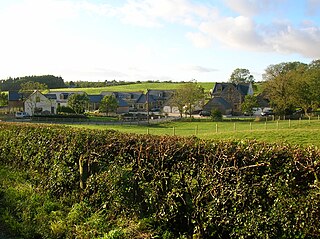
Handsome Nell was the first song written by Robert Burns, often treated as a poem, that was first published in the last volume of James Johnson's Scots Musical Museum in 1803 (No.551) with an untitled tune. Burns recorded in holograph on page three of his first Commonplace Book that he wrote the song or Rhyme at the age of only fifteen whilst living at Mount Oliphant Farm, it is regarded as his earliest production, inspired by a farm servant aged fourteen, named either Nelly Kilpatrick or Nelly Blair. Some confusion exists as he also gave his age as 16 in his autobiographical letter to Dr. Moore; the autumn of 1774 is generally accepted.

James M'Kie or James McKie (1816–1891) was an apprentice of Hugh Crawford, John Wilson's successor at the Kilmarnock Cross printing business. In 1867, M'Kie published the first facsimile edition of the 1786 "Kilmarnock Edition" or Poems, Chiefly in the Scottish Dialect as well as various bibliographies, reprints, special editions, limited editions, etc. of Robert Burns' and other works for the Scottish, British, British Empire or North American markets. He became an avid collector of Burnsiana and put together the largest collection of published in the world at the time, that was eventually purchased by the local Kilmarnock Corporation and housed in the Kay Park Burns Museum.
Len Pennie is a Scottish poet and Scots language and mental health advocate. She became known on social media in 2020 during the COVID-19 pandemic in Scotland for her "Scots word of the day" and poem videos. In March 2022, her Twitter and Tiktok accounts had over 400,000 followers worldwide.
Ebenezer Picken was a Scottish poet and songwriter known as "The Poet of Paisley." He wrote poetry in English and Scots and produced a dictionary of Scottish words which was published posthumously.
References
- 1 2 "Rab Wilson". Scottish Book Trust. Retrieved 24 January 2014.
- ↑ "Rab Wilson". Scottish Poetry Library. Retrieved 24 January 2014.
- 1 2 3 "Scots wha hae seen top Tory put to the knife". The Scotsman. 31 January 2009. Retrieved 24 January 2014.
- ↑ "Rab Wilson says nomination for Burns award 'doubly welcome'". Cumnock Chronicle. 30 December 2013. Retrieved 24 January 2014.
- ↑ McArdle, Helen (25 November 2013). "Whistleblower takes NHS case to Scottish Parliament". The Glasgow Herald. Retrieved 24 January 2014.
- ↑ "Health board accused of 'serious failings' by information commissioner". The Scotsman. 22 February 2012. Retrieved 24 January 2014.
- ↑ Forsyth, John (11 June 2012). "Poetic justice: delegates left pond'ring value of a rhyming verse or two". The Scotsman. Retrieved 24 January 2014.
- 1 2 "New take on work of Robert Burns". Dundee Evening Telegraph. 14 December 2013. Retrieved 24 January 2014.
- ↑ Kelly, Stuart (31 October 2009). "Did Burns steal ideas from an English poet?". The Scotsman. Retrieved 24 January 2014.
- ↑ "Poet Rab Wilson named as first James Hogg writer-in-residence". BBC. 28 June 2013. Retrieved 24 January 2014.
- ↑ "Full Report: Scottish poet heads to the hills". ITV News. 8 August 2013. Retrieved 24 January 2014.
- ↑ "Liam Logan meets Scots poet, Rab Wilson". BBC. 26 November 2006. Retrieved 24 January 2014.
- ↑ "Rhyme time". Southern Reporter. 5 July 2013. Retrieved 24 January 2014.
- ↑ "Rab Wilson's new book on the satires of Horace". BBC. Retrieved 24 January 2014.
- ↑ Kuntzman, Gersh (2 April 2012). "Call It 'Spoke and Word' Night at Red Lantern Bicycles". New York Times. Retrieved 24 January 2014.